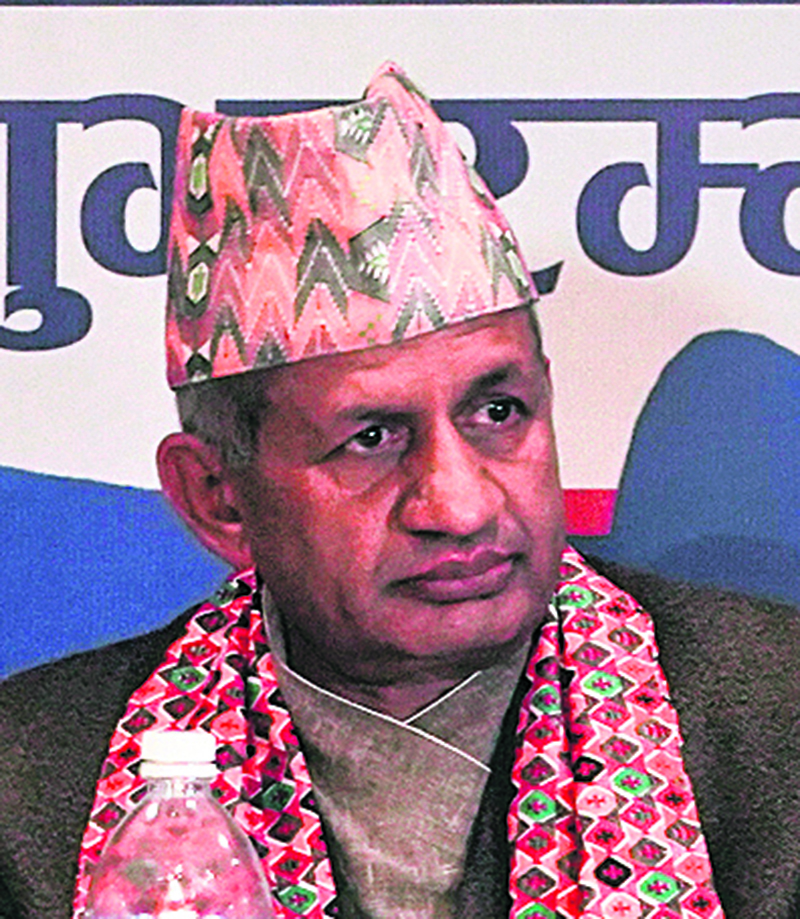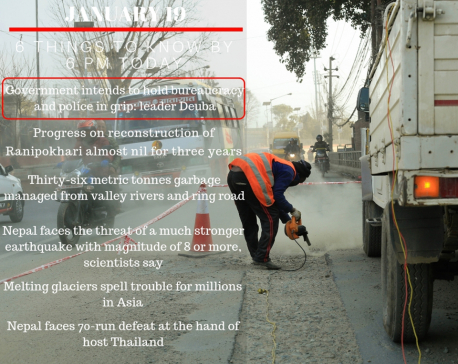
OR
Debt trap warnings over BRI projects motivated by bias: FM Gyawali
Published On: April 23, 2019 05:30 AM NPT By: Republica | @RepublicaNepal

KATHMANDU, April 23: Dismissing suggestions that Nepal could fall into a Chinese debt trap if it chose to take loans under the Belt and Road Initiatives (BRI), Minister for Foreign Affairs Pradeep Kumar Gyawali has said that such suggestions were motivated by bias.
Responding to queries from journalists over concerns in various quarters that BRI loans could possibly push Nepal into a serious debt trap, Ministers Gyawali said Nepal was aware what it should do and what it should not do to fulfill its national interests. “It would be better on the part of friends wary of Nepal's future to give us information about charitable organizations that extend loans at zero interest ,” he said
Arguing that Nepal was free to decide on its development initiatives, Gyawali said Nepal would decide independently on Chinese loans and the selection of projects under BRI.
He argued that Chinese debt was not behind the serious economic crises in many Latin American countries including in Argentina back in the 1990s and 2000s. “They were not under the Chinese debt trap. Greece is still struggling with a serious economic crisis. Many other countries have also fallen into debt traps,” he said.
“What this means is there is no rule that one would fall into a debt trap through taking loans from one country and not fall into it when loans are taken from other country,” he further said. “The main thing is how projects are selected, whether they are selected on the basis of possible returns. And what is the pay back plan?”
Gyawali informed that Nepal was currently holding discussions with the Chinese on the projects to be incorporated into BRI.
Arguing that it was not possible to bring in developing by closing doors to immediate neighbors, he said that Nepal was trying to connect with the development achieved by its neighbors through various means including through connectivity projects. “We may have some differences with friendly nations, but we do not have any hostile feelings. There will be nothing that infringes on national interests,” he said. “Nepal won't conduct its foreign policy standing in any of the camps. We will move ahead with a balanced and friendly policy towards all.”
Speaking at an interaction organized by Reporters' Club Nepal in the capital on Monday, Gyawali said the visit of President Bidya Devi Bhandari to China beginning Wednesday held huge importance as this was the first state level visit of a Nepalese head of the state since the establishment of a federal republic. He said the visit was expected to connect Nepal's development endeavors with Chinese development success.
President Bhandari is scheduled to take part in a roundtable to be hosted by her Chinese counterpart Xi Jinping and hold bilateral talks with Xi on April 29. Nepal and China are scheduled to sign the protocol of the Nepal-China Transit Transport Agreement during the visit. The protocol paves the way for the implementation of the agreement and allows Nepal third country transit facilities via Chinese ports.
Secretary at the Ministry of Industry, Commerce and Supplies Kedar Bahadur Adhikari will sign the protocol with his Chinese counterpart during the forum. The protocol, according to officials, allows more flexible terms for trade and transit and might be feasible for trading with South East Asian countries also.
Unlike bilateral agreements with India, the agreement is flexible and allows open utilization of either inland waterways or roads for transit and transport to sea ports. Nepal signed the Transit Transport Agreement with China in 2016 when it was facing a five-months blockade by India.
Likewise, Minister for Physical Infrastructure and Transport Raghubir Mahaseth is scheduled to deliver a speech on 'Infrastructure and Connectivity” during the forum. However, no major agreements are likely be signed by the ministry during the visit, according to Joint Secretary at the ministry Gopal Sigdel.
You May Like This

Terms used wisely in agreement: Home Minister Thapa
KATHMANDU, Mar 10: Home Minister Ram Bahadur Thapa has said he was surprised to receive reactions from various angles on... Read More...

Govt should be centered in single direction, Chief Minister Gurung says
KASKI, Feb 17: Chief Minister of Gandaki Province Prithvi Subba Gurung has said that the entire goals and planning of... Read More...

Jan 19: 6 things to know by 6 PM today
Your daily dose of missed important news of the day. ... Read More...









Just In
- Heavy rainfall likely in Bagmati and Sudurpaschim provinces
- Bangladesh protest leaders taken from hospital by police
- Challenges Confronting the New Coalition
- NRB introduces cautiously flexible measures to address ongoing slowdown in various economic sectors
- Forced Covid-19 cremations: is it too late for redemption?
- NRB to provide collateral-free loans to foreign employment seekers
- NEB to publish Grade 12 results next week
- Body handover begins; Relatives remain dissatisfied with insurance, compensation amount








Leave A Comment